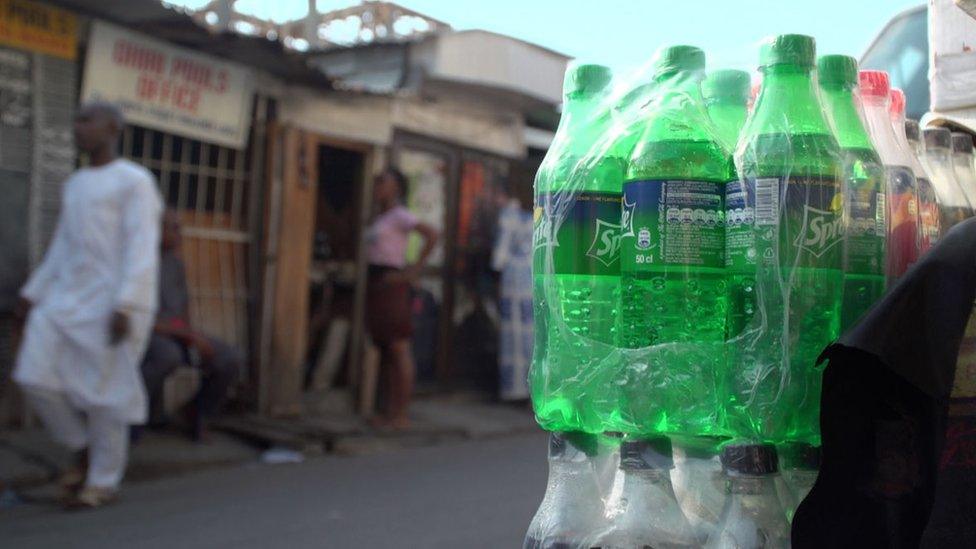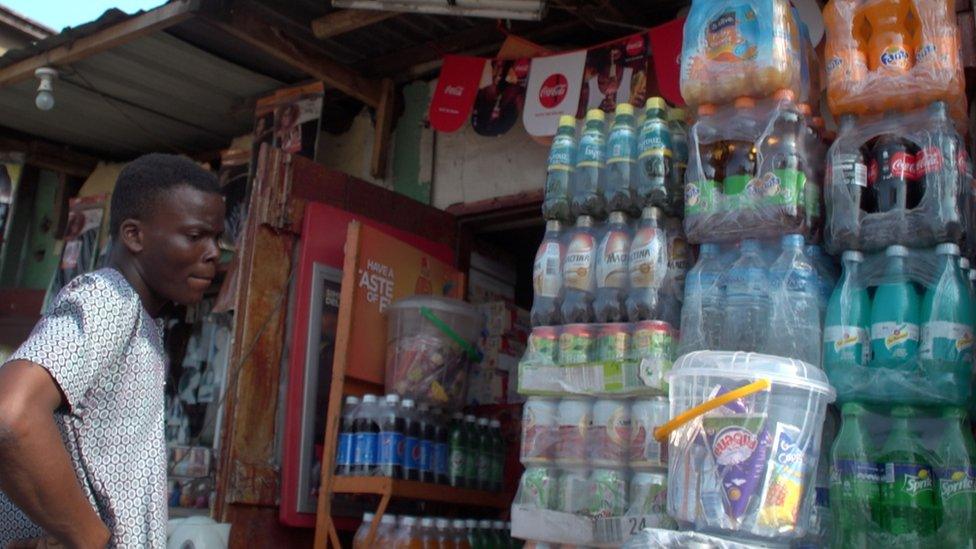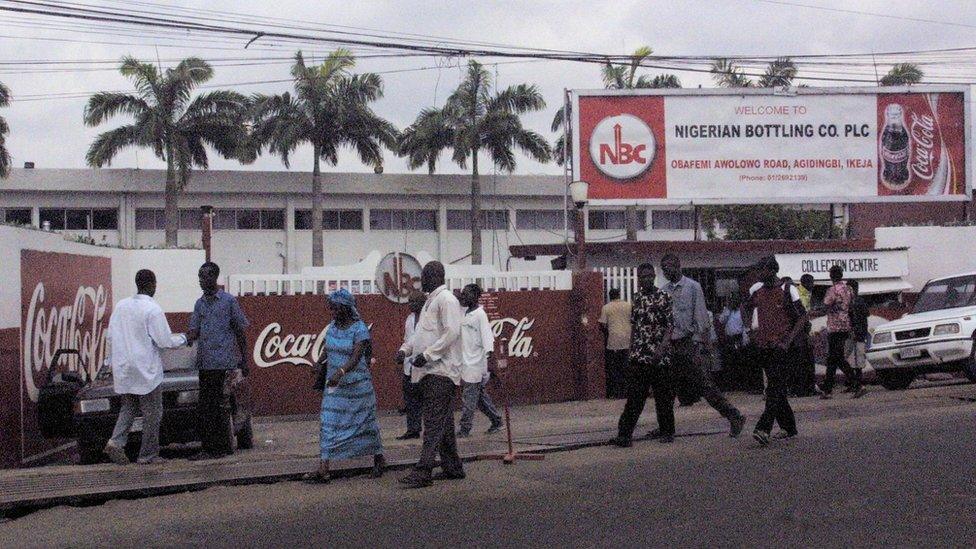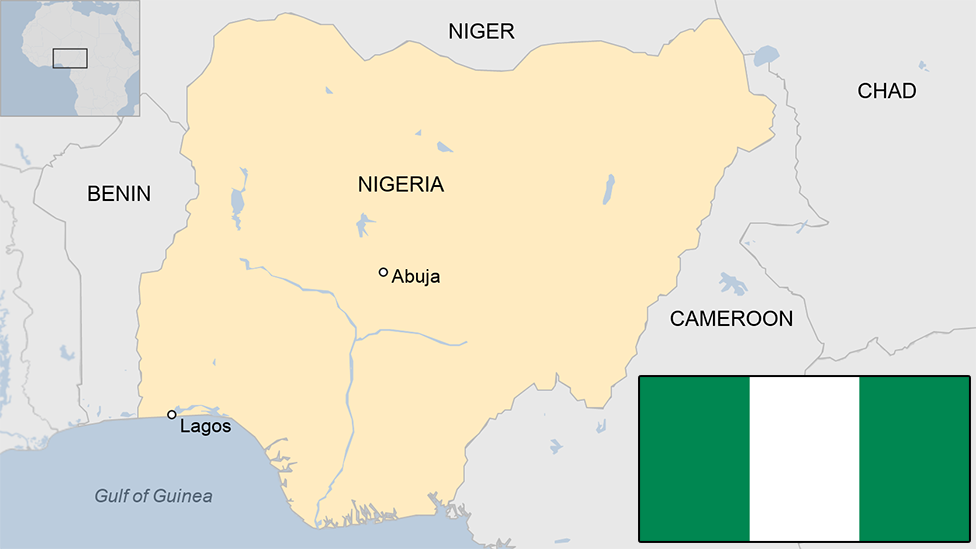Is it safe to drink Fanta and Sprite in Nigeria?
- Published

A recent court case in Nigeria has highlighted concerns that locally made soft drinks may be considered unsafe for human consumption elsewhere, as Ijeoma Ndukwe explains.
There has been uproar in Nigeria after it emerged that the company that manufactures Fanta and Sprite, the Nigeria Bottling Company (NBC), has been ordered by a court to place warning labels on its products, stating that they are unsafe when consumed alongside vitamin C.
The drinks are said by critics to contain high levels of the preservative benzoic acid and the colouring sunset yellow.
NBC is challenging the ruling.
The case has caused deepening concern in a country where Fanta, Sprite and Coca-Cola are probably the most widely consumed soft drinks.
Barbara Ukpabi owns a grill restaurant which serves local food in Oniru, Lagos. She says she might stop buying Fanta and Sprite for the restaurant and also has concerns about giving the drinks to her children.
"I was thinking of reducing how much I drink of it. I'll be thinking of drinking less of it or going to other substitutes like juice."
Although like many Nigerians, the habit is hard to break.
"I just had my lunch and I had Coke and water."
Security guard John Uloko didn't see the reports about the soft drinks in the newspapers but heard about it via WhatsApp and hasn't drunk any since.
'Flexing their muscles'
The ruling was the result of a nine-year-long court battle initiated by Nigerian businessman Fijabi Adebo.

John Uloko has stopped drinking Fanta and Sprite
In 2007, Mr Adebo shipped Nigerian-made Fanta and Sprite to the UK to sell at his chain of shops in Manchester.
His shipment was confiscated by UK customs, originally because of concerns about the authenticity of the beverages.
But when the UK health authorities tested the products, they were declared unsafe for human consumption and destroyed.
Mr Adebo sued NBC, Coca-Cola's franchise owner in Nigeria, which had sold him the products.
They had refused to take financial responsibility for the incident.
He later extended the case to include the food standards agency Nafdac, on the grounds that it had allegedly not performed its duty.
Last month - nearly 10 years after he filed his case - a Lagos high court ruled against Nafdac and ordered the Nigerian Bottling Company to place written warnings on its Fanta and Sprite bottles.As NBC is appealing, the labels have not yet been added to the bottles.
Mr Adebo told the BBC: "Initially they were flexing their muscles, which dragged [out] the process. I went to court to compel Nafdac to do its duty.

The warnings have not yet appeared as the ruling is being challenged
"We shouldn't have a product that is considered substandard in Europe."
His viewpoint is echoed by many, angered that products considered unsafe for consumption in the UK are legal in Nigeria.
The case has prompted discussions about accepted standards in the country.
Although benzoic acid is widely used as an antibacterial and antifungal preservative in acidic foods and beverages to extend their shelf life, studies have shown that the chemical can cause health problems in certain circumstances.
'Toxic'
A scientist based in Nigeria, who has dealings with Nafdac and asked to remain anonymous, says some human toxicity studies have shown that benzoic acid may react with ascorbic acid (vitamin C) in soft drinks, forming benzene, external.
"While benzoic acid itself is relatively non-toxic, when benzene is formed in the presence of ascorbic acid in foods it is particularly dangerous, as benzene is widely known to be toxic and linked to many forms of cancer. These include leukaemia and other cancers of the blood," the scientist said.
The secretary-general of the Nigerian Medical Association says it is impossible to make a judgement about acceptable levels of benzoic acid without conducting a local study looking at health implications over a long period of time.

Soft drinks may need more preservative in hotter countries
Dr Yusuf Sununu Tanko says there are a number of examples where evaluations are different between countries because of differences in physical constitution, diet and environment.
"Each country has its own acceptable value of what is considered normal for what is fit for human consumption," he says.
Nigeria's health ministry published a statement in response to the public outcry, external, reassuring Nigerians that the drinks are safe for human consumption.
However, the ministry advises that medicines are taken with water to help "prevent unexpected drug-food interactions".
Although the government has not spoken of enforcement, it "encourages" all bottling companies to include advisory warnings on all relevant products.
The Nigerian Bottling Company has appealed against the court ruling. It says, external the levels of benzoic acid in its soft drinks are "well within the levels approved" by both the national regulator and Codex Alimentarius, an international food standards body.
The company also says the ingredient levels set by countries for their food and beverages are influenced by factors such as climate, with drinks in hotter countries needing higher levels of preservative.
It also says there was "no proven case of negligence" or finding that the company had breached its duty of care to consumers.
The government's Consumer Protection Council has formally requested documents from the Nigerian Bottling Company ahead of an independent inquiry.
With an appeal in motion and a government inquiry under way, this case is far from over.
- Published9 March 2017

- Published28 July 2023
